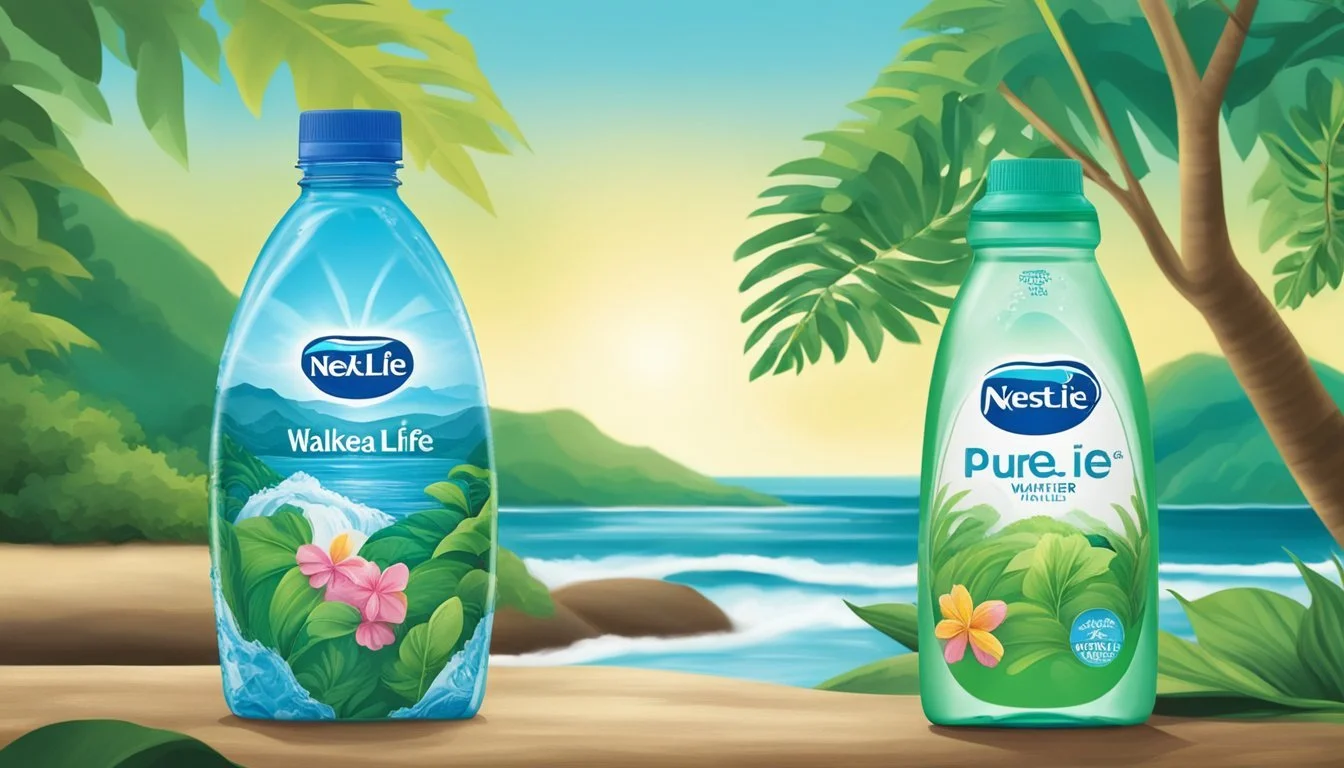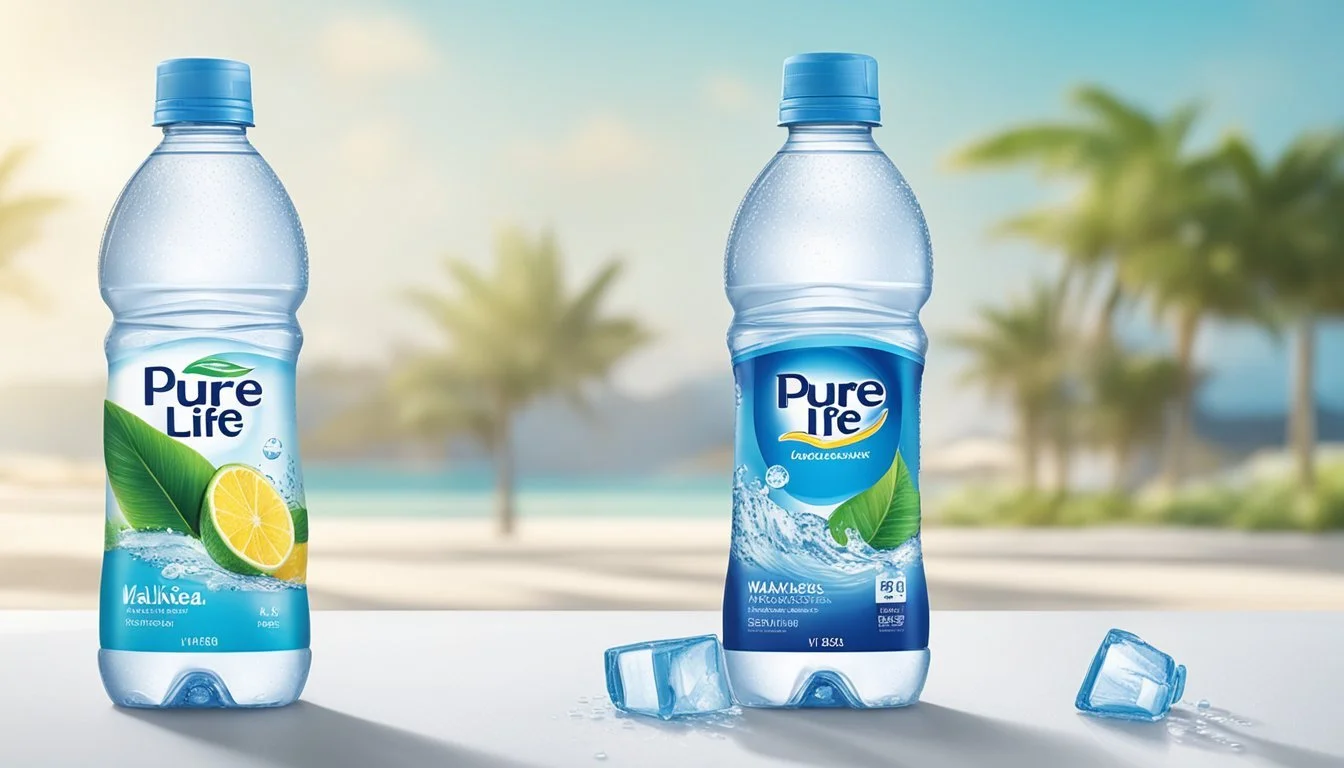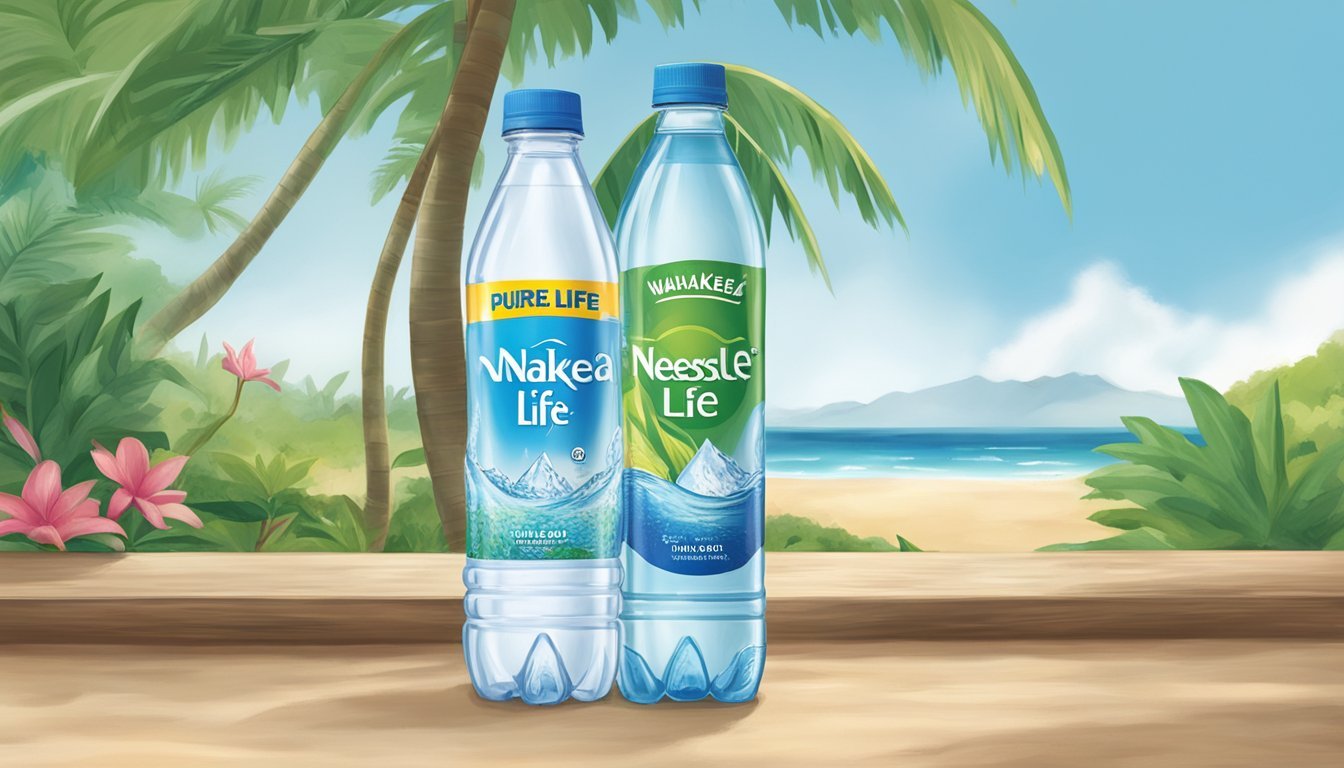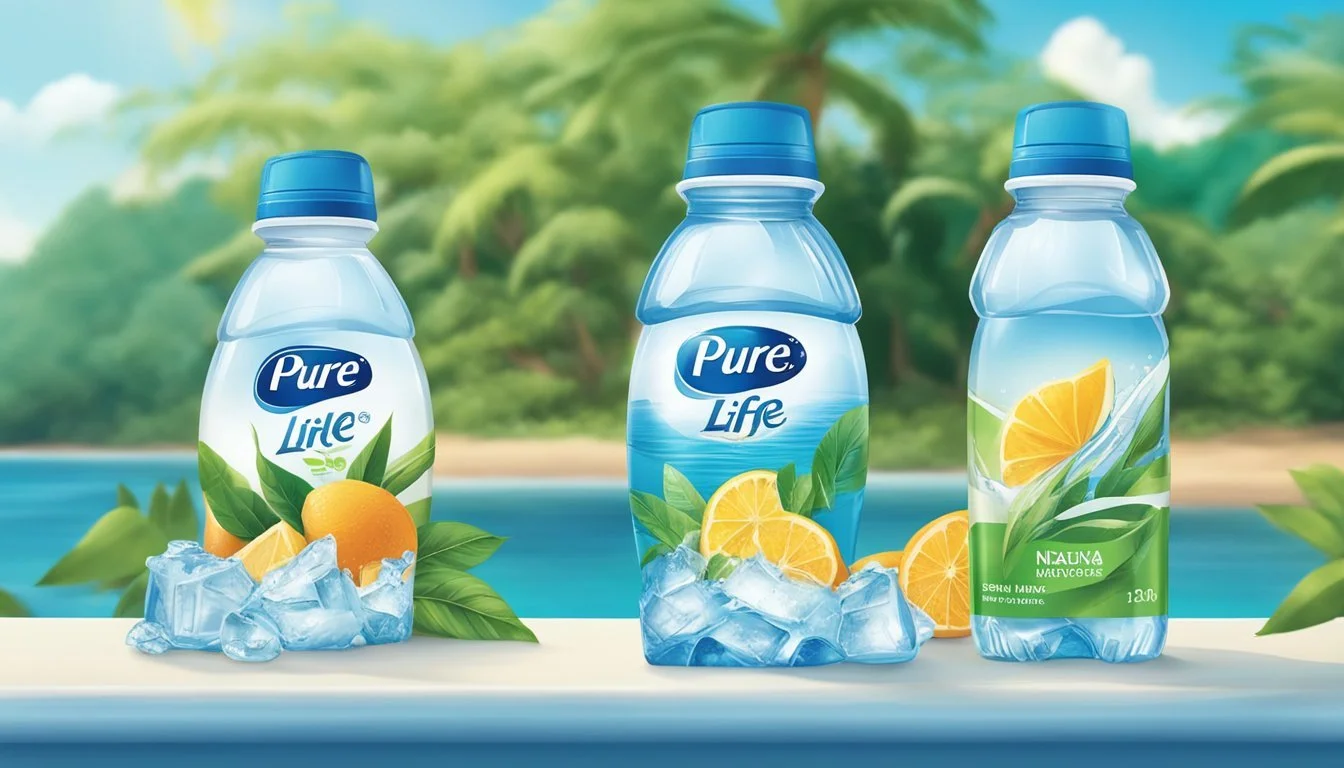Nestlé Pure Life vs. Waiakea
Comparing Quality, Taste, and Sustainability
Choosing the right bottled water is a crucial decision, especially for those who prioritize hydration, taste, and health benefits. Nestlé Pure Life and Waiakea are two popular brands that often come up in conversations. While both options aim to offer clean and refreshing hydration, they differ significantly in terms of source, taste, and health benefits. For those looking for a highly alkaline water with unique mineral content and eco-friendly packaging, Waiakea is a standout choice.
Nestlé Pure Life is a well-known name in the bottled water industry. Its widespread availability and affordability make it a go-to for many. Although praised for its reliability, some consumers question its source and purity. On the other hand, Waiakea offers volcanic water from Hawaii, known for its naturally high alkalinity and unique mineral composition. This not only enhances its taste but also potentially offers more health benefits.
In the battle of Nestlé Pure Life vs. Waiakea, it often comes down to personal preferences and priorities. Those who value sustainability and a superior taste profile might lean towards Waiakea. While those who prefer a budget-friendly and widely accessible option may choose Nestlé Pure Life. Regardless of preference, understanding the differences between these brands can help make a more informed decision.
Understanding Bottled Water
Bottled water has distinct categories, each regulated and catering to various consumer needs. Industry practices and regulatory standards significantly influence bottled water quality and safety.
Types of Bottled Water
Several types of bottled water exist with unique sources and characteristics. Spring water is sourced from underground formations and must flow naturally to the earth's surface. Mineral water contains both dissolved minerals and trace elements, present at the source. Purified water undergoes rigorous processes like distillation or reverse osmosis, removing impurities and ensuring high purity. Artesian water originates from confined aquifers. Each type is chosen based on specific uses and health benefits.
Regulatory Standards
Bottled water in the United States is regulated by the Food and Drug Administration (FDA). These regulations ensure bottled waters match the stringent safety and health standards similar to tap water. Water sources must be protected from contamination, and the bottling process must adhere to Good Manufacturing Practices (GMP). Regular testing ensures bottled water remains free from harmful substances, providing consumers with safe drinking options.
Bottled Water Industry Overview
The bottled water industry is a significant segment of the Consumer Packaged Goods (CPG) sector. It addresses public demand for convenient and health-conscious hydration solutions. Leading brands such as Nestlé Pure Life and Waiakea contribute to the market with unique selling points like mineral composition and environmental initiatives. Carbon neutral certifications and nonprofit donations showcase the industry's commitment to sustainability. As the market evolves, consumer preferences and environmental concerns continue to shape its trends and innovations.
Brand Profiles
In this section, we provide detailed profiles for both Nestlé Pure Life and Waiakea, focusing on their origins, sourcing methods, and brand characteristics.
Nestlé Pure Life
Nestlé Pure Life, a product of Nestlé Waters, is widely recognized for its purified water offerings. Sourced from wells and public water supplies, the water undergoes a rigorous purification process to ensure its safety and cleanliness.
Nestlé owns numerous water brands globally, but Pure Life remains among its most popular.
Its widespread availability and frequent sales in large quantities often make it a cost-effective choice.
Key highlights:
Origin: Various sources, purified extensively.
Sourcing: Combination of wells and public water systems.
Availability: High, often in bulk packaging.
Waiakea
Waiakea stands out for its commitment to sustainability and ethical practices. The water is naturally filtered through volcanic rock in Hawaii, giving it a distinct mineral profile and alkaline pH.
Waiakea's commitment to environmental responsibility includes being the first US bottled water certified Carbon Neutral and donating a portion of its revenue to global and local nonprofit organizations.
Key highlights:
Origin: Hawaii, filtered through volcanic rock.
Sourcing: Renewable, sustainable methods.
Environmental Impact: Certified Carbon Neutral, charitable contributions.
These concise profiles provide a snapshot of the core attributes, sourcing practices, and values of Nestlé Pure Life and Waiakea, valuable for anyone comparing these two brands.
Comparative Analysis
Nestlé Pure Life and Waiakea are two popular bottled water brands that consumers often debate over. Key points of comparison include purity, taste, source, and environmental impact.
Purity and Quality
Nestlé Pure Life uses a multi-stage filtration process to ensure high quality. This includes micro-filtration, reverse osmosis, and ultraviolet light treatment. These steps help remove impurities and contaminants, making the water safe to drink.
In contrast, Waiakea prides itself on being naturally alkaline with a pH level of 8.2. The water undergoes thorough filtration without losing minerals. This natural approach enhances the water’s purity while maintaining essential minerals such as calcium and magnesium.
Taste Profile
Taste is subjective, but specific qualities can be highlighted. Nestlé Pure Life has a clean, neutral taste. This can be attributed to its rigorous filtration process, which strips away most impurities.
Waiakea offers a slight mineral taste, owing to its volcanic filtration process. Consumers who prefer mineral-rich water often favor Waiakea for its more complex flavor profile. The natural minerals not only add to the taste but also provide added health benefits.
Source and Origin
Nestlé Pure Life is derived from multiple municipal sources and then purified. This process ensures a consistent quality but may lead to variations in taste due to different initial water sources.
Waiakea is sourced from the Kea’au aquifer in Hawaii. The water filters through volcanic rock, which contributes to its unique mineral composition. The sourcing from a single natural aquifer gives Waiakea a distinct origin that many consumers find appealing.
Environmental Impact
Nestlé Pure Life follows industry standards for sustainability but has faced criticism for its use of plastic bottles. The company has made efforts to reduce plastic usage and improve recycling rates. They claim ongoing improvements in their environmental footprint.
Waiakea emphasizes its commitment to sustainability. It was the first U.S. bottled water to be certified Carbon Neutral. The company uses 100% RPET (recycled polyethylene terephthalate) bottles and contributes a portion of its revenue to environmental and social causes.
The focus on sustainability and minimal carbon footprint makes Waiakea a favorable choice for environmentally-conscious consumers.
Health and Hydration
Nestlé Pure Life and Waiakea both offer unique health benefits and hydration advantages due to their distinct properties such as mineral content and pH levels.
Hydration and Health Benefits
Adequate hydration is crucial for maintaining bodily functions, from regulating temperature to supporting metabolism. Nestlé Pure Life aims to provide accessible hydration with its widespread availability and affordability. Waiakea, with its naturally high alkaline pH of 8.8, offers benefits such as neutralizing body acidity and helping with metabolism.
Both brands emphasize pure and clean water, but Waiakea takes additional steps by being certified Carbon Neutral and donating a portion of their revenue to non-profits. This commitment to social responsibility adds an extra dimension to the health benefits Waiakea users might consider.
Minerals and Electrolytes
Mineral and electrolyte content can influence the health benefits of bottled water. Nestlé Pure Life contains essential minerals like calcium and magnesium, critical for bone health and muscle function. This makes it a practical choice for those looking for mineral replenishment in their daily hydration.
Waiakea's naturally sourced water from volcanic rock filtration results in high levels of silica, contributing to better skin health and elasticity. Additionally, its alkalinity helps in maintaining a balanced pH level in the body. Both brands ensure their waters are free from heavy metals and contaminants, prioritizing overall consumer safety.
These diverse attributes cater to different health needs, making each water brand beneficial in its own right.
Production and Packaging
Nestlé Pure Life and Waiakea use distinct methods in the production and packaging of their bottled water, catering to their unique brand philosophies and consumer expectations.
Filtration Processes
Nestlé Pure Life employs a rigorous multi-step filtration process, which includes microfiltration, reverse osmosis, and ozonation. This extensive method ensures the removal of impurities and provides consistent quality across all markets.
Conversely, Waiakea water undergoes a natural purification process. Sourced from a volcanic well in Hawaii, Waiakea benefits from natural filtration through porous volcanic rock, enhancing its mineral content and alkalinity. Waiakea highlights its minimal human intervention, sticking closely to its commitment to natural purity.
Bottling and Packaging
Nestlé Pure Life primarily uses PET plastic bottles, known for their lightweight and convenience. Nestlé has initiatives to enhance sustainability, such as increasing the use of recycled materials in their bottles and promoting recyclability.
In contrast, Waiakea adopts a more eco-friendly approach. Their bottles are made of 100% recycled materials. Additionally, Waiakea is certified Carbon Neutral and donates a portion of its revenue to environmental causes, endorsing a broader commitment to sustainability.
Both brands offer their water in various sizes and types of packaging, emphasizing different aspects of sustainability and consumer convenience.
Sustainability and Ethics
Nestlé Pure Life and Waiakea have distinct approaches to sustainability and corporate ethics. Both brands claim to prioritize eco-friendly practices, but their methods and effectiveness vary significantly.
Eco-Friendly Practices
Nestlé Pure Life uses plastic bottles, raising concerns about environmental waste. Although they promote recycling, plastics still contribute to pollution. On the other hand, Waiakea opts for renewable materials like reusable glass, reducing their environmental footprint. Waiakea was also the first U.S. bottled water to be certified Carbon Neutral, underscoring their commitment to lowering their carbon footprint and promoting an eco-friendly approach.
Water Source Sustainability
Nestlé Pure Life sources water from multiple locations, which may impact local water supplies. These practices provoke questions about the long-term sustainability of their water sources. In contrast, Waiakea sources its water from Hawaiian volcanic springs, which are naturally replenished. This method of sourcing ensures a more sustainable and reliable supply of water, aligning with environmental preservation objectives.
Corporate Responsibility
Nestlé Pure Life has faced criticism regarding its ethical standards and the environmental impact of its production processes. Despite being listed in The Good Shopping Guide's Ethical Bottled Water Ratings Table, the brand still has strides to make in improving its sustainability and ethical behavior. Waiakea, conversely, donates over 5% of revenue to nonprofit organizations and emphasizes community benefits. Their efforts suggest a strong corporate responsibility, focusing on people and the planet over mere profits.
These differences highlight the varied approaches that each brand takes towards sustainability and ethics.
Consumer Insights
Consumers' opinions on Nestlé Pure Life and Waiakea revolve around factors such as brand perception, taste preferences, and value for money. Below, the details of market trends and consumer preferences, along with the distinction between premium and standard brands, are examined.
Market Trends and Preferences
Nestlé Pure Life has a broad market presence due to its affordability and availability. Shoppers appreciate its neutral taste and consistent quality. Waiakea, positioned as a premium brand, appeals to those looking for unique attributes such as volcanic filtration and environmental sustainability.
Consumers have grown increasingly aware of sourcing and processing techniques. They prioritize brands that align with their health and environmental values. Both brands claim to have stringent quality control and are mindful of microplastics and chemical contaminants.
Taste tests often reveal a preference split; some prefer the fresh, mineral-rich taste of Waiakea, while others are satisfied with the straightforward flavor of Nestlé Pure Life. Participants in these taste tests might value either the more sophisticated palate of Waiakea or the everyday familiarity of Nestlé Pure Life.
Premium vs. Standard Brands
Waiakea is marketed as a premium brand, justifying higher prices with its unique selling points such as alkaline pH, silica content, and eco-conscious packaging. It targets consumers willing to pay more for perceived health benefits and environmental responsibility.
Nestlé Pure Life, on the other hand, is positioned as a standard brand, being one of the largest bottled water brands globally. Its primary advantage lies in its cost-effectiveness and widespread availability. This attracts budget-conscious consumers who still seek reliable quality.
When comparing, it's evident that premium brands like Waiakea capitalize on niche markets interested in quality and ethics, while standard brands like Nestlé Pure Life focus on mass market appeal and accessibility. These distinctions guide consumer purchasing decisions based on budget, values, and taste preferences.
Final Thoughts
Nestlé Pure Life and Waiakea both offer distinct advantages depending on one's priorities.
For safety, Nestlé Pure Life adheres to rigorous standards to ensure the purity and safety of their water.
Waiakea, known for its naturally alkaline water, also emphasizes safety, achieving carbon-neutral certification.
In terms of convenience, Nestlé Pure Life is widely available in various regions and often sold in bulk, making it a practical choice for families and events.
Waiakea's distribution may be more limited, but they offer sustainable packaging that appeals to eco-conscious consumers.
Fresh taste is another critical factor. Nestlé Pure Life is known for delivering a clean and neutral flavor.
Waiakea stands out with its smooth and slightly crisp taste due to its volcanic filtration process.
Both brands focus on ensuring pure water, each with unique sourcing methods. Nestlé Pure Life uses multiple sources and meticulous purification processes.
Waiakea sources from the Mauna Loa volcano, providing water with natural minerals.
Nestlé Pure Life Waiakea Safety Rigorous standards Carbon-neutral certification Convenience Widely available, sold in bulk Sustainable packaging Fresh Taste Clean and neutral flavor Smooth and crisp due to volcanic filtration Pure Water Multiple sources, meticulous purification Sourced from Mauna Loa volcano
Nestlé Pure Life emphasizes wide availability and rigorous safety measures.
Waiakea offers a unique taste and sustainable practices.
Choosing between these brands depends on individual preferences, safety concerns, and environmental considerations.
More About Nestlé Pure Life
Acqua Panna vs Nestle Pure Life: Which Bottled Water is Better?
Aquafina vs Nestle Pure Life: Which Bottled Water is Better?
Arrowhead vs Nestle Pure Life: Which Bottled Water is Better?
Boxed Water vs Nestle Pure Life: Which Bottled Water is Better?
Core Hydration vs Nestle Pure Life: Which Bottled Water is Better?
Deer Park vs Nestle Pure Life: Which Bottled Water is Better?
Essentia vs Nestle Pure Life: Which Bottled Water is Better?
Ice Mountain vs Nestle Pure Life: Which Bottled Water is Better?
Icelandic Glacial vs Nestle Pure Life: Which Bottled Water is Better?
Just Water vs Nestle Pure Life: Which Bottled Water is Better?
Mountain Valley Spring Water vs Nestle Pure Life: Which Bottled Water is Better?
Nestle Pure Life vs 1907water: Which Bottled Water is Better?
Nestle Pure Life vs 7-Select: Which Bottled Water is Better?
Nestle Pure Life vs Alkaline88: Which Bottled Water is Better?
Nestle Pure Life vs Antipodes: Which Bottled Water is Better?
Nestle Pure Life vs Aqua Carpatica: Which Bottled Water is Better?
Nestle Pure Life vs Big Chill: Which Bottled Water is Better?
Nestle Pure Life vs BodyArmor: Which Bottled Water is Better?
Nestle Pure Life vs Cascade Mountain: Which Bottled Water is Better?
Nestle Pure Life vs Castle Rock: Which Bottled Water is Better?
Nestle Pure Life vs CBD Living: Which Bottled Water is Better?
Nestle Pure Life vs Crystal Geyser: Which Bottled Water is Better?
Nestle Pure Life vs Crystal Lake: Which Bottled Water is Better?
Nestle Pure Life vs Essence pH10: Which Bottled Water is Better?
Nestle Pure Life vs Hawaii Volcanic: Which Bottled Water is Better?
Nestle Pure Life vs Hawaiian Springs: Which Bottled Water is Better?
Nestle Pure Life vs Kirkland Signature: Which Bottled Water is Better?
Nestle Pure Life vs Liquid Death: Which Bottled Water is Better?
Nestle Pure Life vs Mananalu: Which Bottled Water is Better?
Nestle Pure Life vs Open Water: Which Bottled Water is Better?
Nestle Pure Life vs Poland Spring: Which Bottled Water is Better?
Nestle Pure Life vs Proud Source: Which Bottled Water is Better?
Nestle Pure Life vs Pure Life: Which Bottled Water is Better?
Nestle Pure Life vs Purely Sedona: Which Bottled Water is Better?
Nestle Pure Life vs Refreshe: Which Bottled Water is Better?
Nestle Pure Life vs Richard's Rainwater: Which Bottled Water is Better?
Nestle Pure Life vs San Pellegrino: Which Bottled Water is Better?
Nestle Pure Life vs Simple Truth: Which Bottled Water is Better?
Nestle Pure Life vs Smartwater: Which Bottled Water is Better?
Nestle Pure Life vs Solan de Cabras: Which Bottled Water is Better?
Nestle Pure Life vs Talking Rain AQA: Which Bottled Water is Better?
Nestle Pure Life vs The Well: Which Bottled Water is Better?
Nestle Pure Life vs Topo Chico: Which Bottled Water is Better?
Nestle Pure Life vs Tru Alka: Which Bottled Water is Better?
Nestle Pure Life vs Weird Water: Which Bottled Water is Better?
Nestle Pure Life vs Whole Foods 365: Which Bottled Water is Better?
Nestle Pure Life vs Whole Foods Italian Still Mineral water: Which Bottled Water is Better?
Nestle Pure Life vs Zephyrhills: Which Bottled Water is Better?
More About Waiakea
Icelandic Glacial vs Waiakea: Which Bottled Water is Better?
Mountain Valley Spring Water vs Waiakea: Which Bottled Water is Better?
Waiakea vs Kirkland Signature: Which Bottled Water is Better?
Waiakea vs Richard's Rainwater: Which Bottled Water is Better?
Waiakea vs Whole Foods Italian Still Mineral water: Which Bottled Water is Better?









